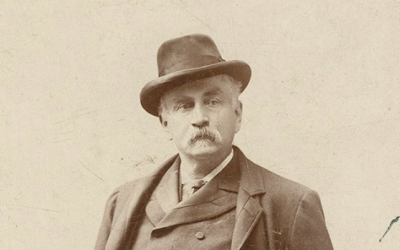Although saloons and billiard halls were not considered respectable businesses by some in frontier society, town boosters often supported their contributions to the local economy. The opening of a new such establishment in Nebraska City in late 1877, for example, was the occasion for effusive congratulations from the local press.
The Nebraska City News on December 1, 1877, announced the opening “of the neatest fitted up billiard hall in this city” and noted that the proprietors, brothers Herman H. and Folkert “Fred” Fass, were “two of the most gentlemanly and polite men that were ever engaged in this line of business in our city.” The Fass brothers, both German immigrants, enjoyed a good reputation locally. “Both of the gentlemen have families and own their own homes in this city,” said the News, “consequently they are not transient among us, but have made Nebraska City their home, identifying themselves with her interests by becoming free-holders. Outside of their business, these gentlemen have many friends who will be pleased to hear of their success and advancement.”
The News went on to describe the new establishment: “The size of the room is 120×40, and is divided into two apartments, i.e. a neatly fitted up card room, containing six tables, is partitioned off in the rear. As you enter the saloon from off Main street, the bar, which is of solid black walnut richly carved stands to your right. Back of this are hung three handsome mirrors while the marble shelf is adorned with the finest of cut glasses and fixtures pertaining to a bar. Over this bar are sold nothing, as we are informed by the Fass Brothers, but the finest brands of liquors and wines, of which they keep a large stock always on hand.
“Leaving the bar and passing farther down the room, we come to the billiard tables, which were put up only yesterday and are of the celebrated J. W. Brunswick & Balke Co. manufacture, and are pronounced by those who handle the one, to be the two of the best tables this side of Chicago. The front room, together with the card room has been lately painted and papered, . . . statutes [statues], in imitation of some of the best pieces of arts being placed between the large pannels on the walls. In fact, as this saloon stands to-day, it certainly reflects much credit on the enterprise of its proprietors.”



